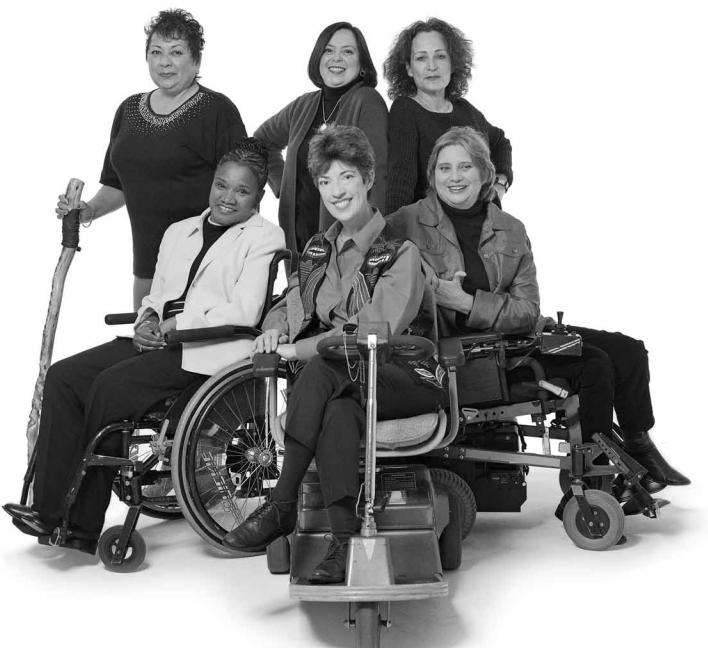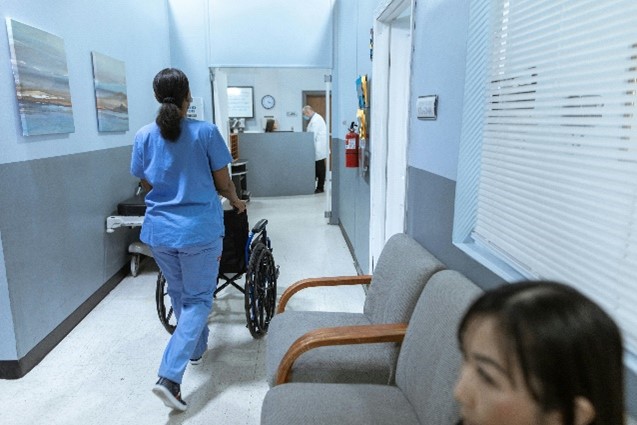
A new article was recently released examining disability accommodations in breast cancer care. Read the full article, written by Shannon Shelton Miller below, or click here to download a PDF copy.
Mammogram Support for People with Disabilities
By Shannon Shelton Miller

Samantha Johnson has known about the importance of breast cancer screening since she was in high school. Now that it’s almost time for her own mammogram, she admits to being somewhat nervous.
“I don’t know what to expect because I haven’t done this before,” Johnson said, asking a panel of experts about the possibility of a prescreening appointment to learn more about what the process entails.
Johnson, who also has cerebral palsy and walks with a cane to help maintain balance, also wants to know if a mammography center or technician would have the accommodations she’d need.
“I wouldn’t need anybody to go with me, but If I need to step up on something, is there someone who will be able to help me or hold their arm if I need help?” she asked. “I don’t know what the machine looks like, and I’d like to know how the environment looks, because again, I’ve never done it, and I’m just curious. I’m not scared, I just want to be mindful of what to prepare for.”
Johnson shared her questions and suggestions during a Sisters Network of Southeast Wisconsin webinar in April on providing mammogram support for people with disabilities. Panelists discussed how patients with different abilities, as Johnson describes herself, can encounter multiple barriers to cancer screening, including lack of disability-related training among medical personnel and limited access to medical facilities and their equipment.
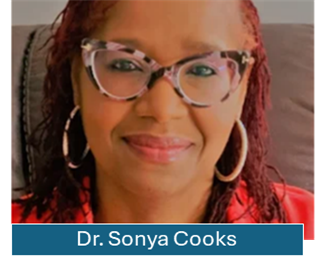
“We’re going to shine a spotlight on an often-overlooked aspect of breast cancer care — unique challenges faced by women with physical disabilities,” said Dr. Sonya Cooks, associate program director and assistant professor at Rosalind Franklin University – College of Nursing and executive member of the Sisters Network of Southeastern Wisconsin. “In a health care system that may not inherently prioritize their needs, it is critical that we address these disparities and ensure all women receive support and the care they deserve.”
Improving outcomes for women with different abilities
The Centers for Disease Control and Prevention’s Right to Know campaign aims to increase awareness of the need for breast cancer screening among women with disabilities. According to their statistics, the percentage of women with disabilities between 50-74 who received a mammogram during the past two years was lower than the percentage of women in the same age range without disabilities. The campaign also cites studies showing higher breast cancer-related death rates among women with disabilities, even when they’re diagnosed at the same stage as their counterparts.
The CDC estimates that 36 million women in the U.S. have disabilities, and about 44% of those aged 65 years or older are living with a disability.
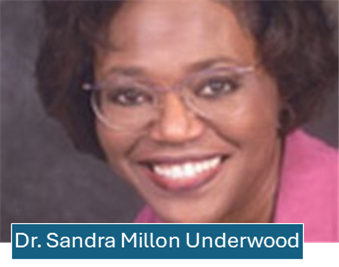
“If we’re fortunate enough to keep living, it’s just a matter of time that we also will have some physical challenges, age challenges that will impact our care,” said Dr. Sandra Millon Underwood, adjunct professor University of Wisconsin Parkside College of Natural and Health Sciences and professor emerita at the University of Wisconsin-Milwaukee. Johnson has volunteered in Underwood’s programs that teach women how to do self-exams to detect potential signs of breast cancer.
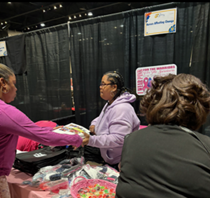
While panelists addressed how physical disabilities could limit access, they noted how other disabilities should be considered when developing policies and procedures, such as mental disabilities, visual and hearing restrictions and mental health concerns. Survivors of trauma and violence could also experience issues that prevent them from being screened.
Katie Jungers, a manager of imaging services for Froedtert and the Medical College of Wisconsin, and Dana Thorson, a mammography technician at Aurora Health Care West Allis, discussed techniques they developed after years of experience dealing with patients of all abilities, along with the services offered through their respective health networks.
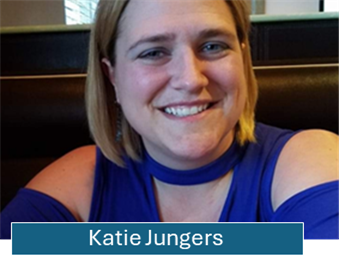
Jungers said nearly all Froedtert facilities are all handicap-accessible and located on the first floor, allowing for easier access. Patients needing additional assistance may actually be booked for a double time slot – giving them more time – and have a second technologist present to help make the exam as painless as possible and ensure quality.
“We want to make sure our patients are getting in at a location that’s close to home, easy to get in and that we’re taking as much time as they need,” Jungers said.
Thorson mentioned similar efforts such as extended appointment times and the presence of an additional technologist to get the best images possible. While scheduling online, users can note whether they’re in a wheelchair, use a cane, are hard of hearing or have other needs, which the technologist can see on her worklist during the appointment.
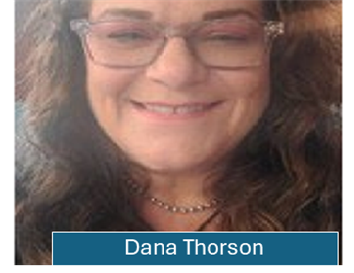
Evening and weekend appointments are also available at their respective networks to accommodate as many people as possible.
Finding what works
One commonality was clear — literature is limited about breast cancer screening for women with disabilities. “You just learn along the way what works,” Thorson said.
Jungers said almost all Froedtert technologists have 15 to 20 years of experience, but annual training of assistive devices takes place so everyone knows how to maneuver patients around the machine. Thorson said she uses similar techniques during screenings and procedures to help accommodate patients who can’t get in certain positions.
“Adding specific training for people with disabilities is not something that’s been touched on very much,” Thorson said. “I’m always looking for new ways to find different literature and verbiage… it’s definitely something we have a need for.”
Dawn Shelton-Williams, a quality specialist and social work navigator for Aurora Family Service, stressed the importance of trauma-informed care.
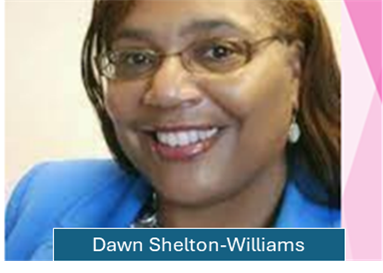
“I think about those challenges and barriers that stop patients from coming in for their screenings,” said Shelton-Williams, a stroke survivor herself. “One of those would be going into the place where you get your mammogram or screening. What does that environment look like? Are there pictures on the wall that show disabled patients? Because that’s sending a message that we welcome everyone.”
Shelton-Williams also talked about the importance of communication, since patients with disabilities might already be dealing with trauma related to their bodies.
“Not knowing what to expect could lead to more stress and anxiety,” she said. “Maybe they’ve had mammograms before experiencing a chronic medical condition and are wondering ‘What can I expect now?’ The more communication that can be shared about this is extremely important.”
The technologists added that family members coming to visits can be helpful, as they’re most familiar with their loved one’s needs and can share what works with the technician.
Mobile mammography units were also mentioned to help increase access, and Jungers said Froedtert planned to launch one next year.
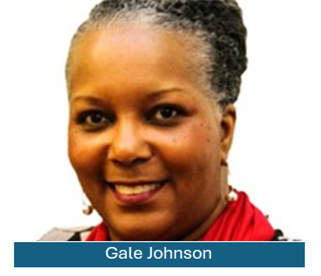
Gale Johnson, the director of the Wisconsin Well Woman Program (WWWP) (the state’s component of the CDC’s National Breast and Cervical Cancer Early Detection Program), mentioned that the program provides accessible transportation for women who need assistance getting to an appointment. The Froedtert & MCW is one of the health networks who partner with the Well Woman Program to make mammograms more accessible to all.
A milestone year
The panelists all responded positively to Samantha Johnson’s recommendations about prescreening appointments and providing other methods to help people with disabilities feel more comfortable about scheduling and receiving a mammogram.
This year will be an important one for her for many reasons. She just earned her master’s degree and, in a few months, she’ll turn 40. She’s already gotten emails about scheduling her mammogram and wants to make sure to start a new decade as healthy as possible.

“I don’t usually see someone with a different ability – I don’t say disability — sharing information like this,” Johnson said. “So what that I have a different ability? We also need the best health care. Just because we have a different ability doesn’t mean we don’t want to be healthy.
Learn more about Sisters Network of Southeast Wisconsin at [email protected] or call (262)-488-7465.
Links –
CDC Disability and Health Promotion
CDC Health Information for Women with Disabilities
CDC Right to Know Breast Cancer Screening Campaign
Sisters Network of Southeastern Wisconsin
Wisconsin Well Woman Program

